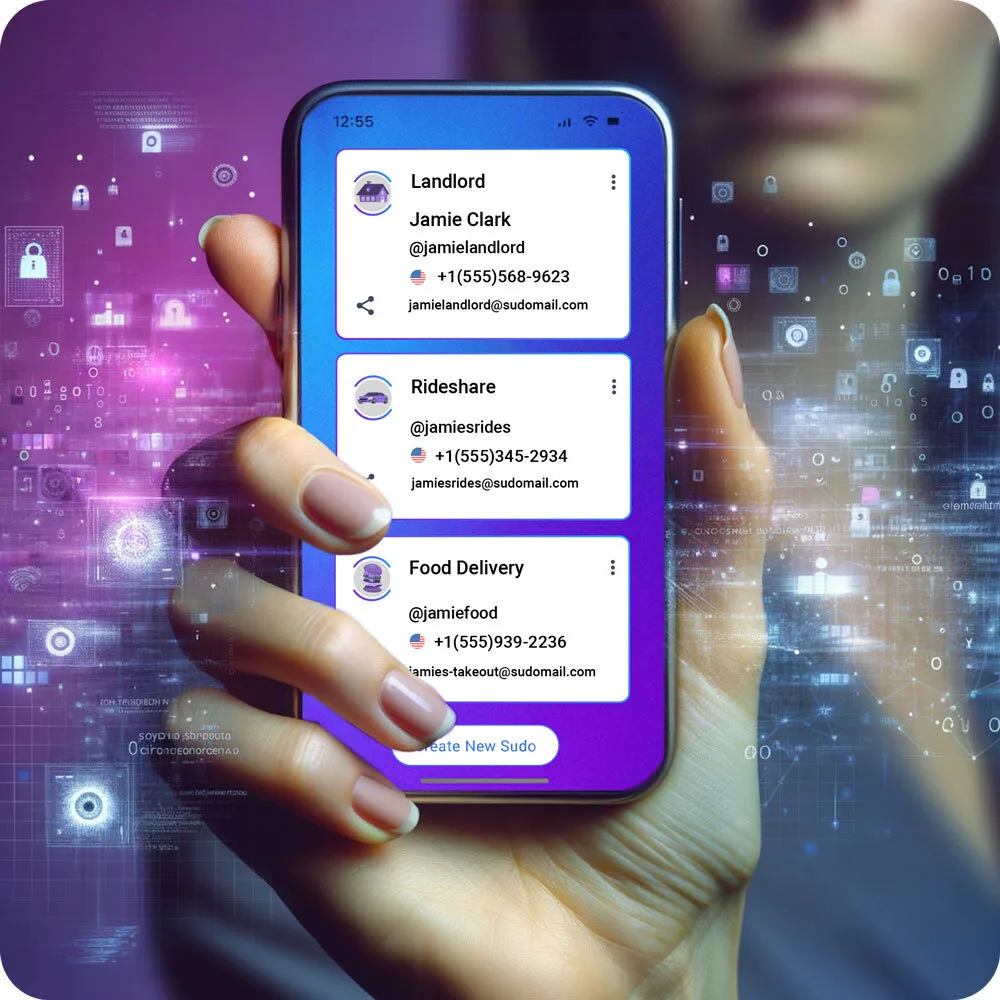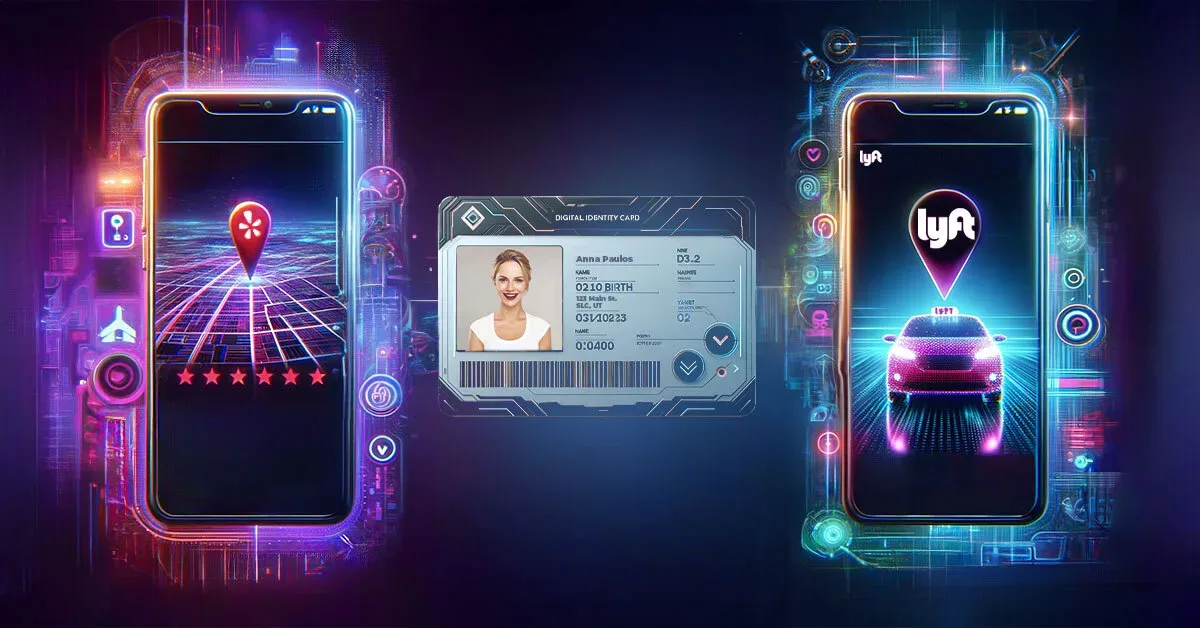Life is lived online, but it doesn’t have to be left online.
If you’ve only ever known the internet, you’re probably pretty comfortable with entering your personal information into web sites and apps, but data breaches, doxing, identity theft, and mass data surveillance hit people hard every day. You can’t be complacent with your privacy and safety.
It’s your right to determine when and where you share your personal information, but people give up that right in exchange for services all the time.
MySudo “power user” and Anonyome Labs’ Director of Customer Solutions, Nick Davidson, says, “Even if you don’t fear lack of privacy, it’s empowering to take back control. It’s your right to decide what information you give to a hairdresser or a hotel check-in counter, for example. And MySudo makes it easy.”
If you can’t answer the reasonable questions of why, what and when—
- “Why does this site, app or person need my info?”
- “What are they doing with it?”
- (And just as important but often overlooked) “When are they going to use it? Just now for this interaction or indefinitely for the next 10 years?”.
—then you need to protect yourself. Here are Nick’s 6 tips:

1. Use multiple Sudos
With MySudo, you can create multiple Sudo digital identities and use them for different activities. “Use multiple Sudos to compartmentalize your information and stop using your own email address and phone number which are being used to build a profile about you,” Nick says.
Nick recommends putting some Sudos in your legal name and others in alternative names or nicknames. He has four Sudos as the “real Nick” and three under an alternative name —which all serve legitimate use cases. Nick says, “This isn’t so you can do something nefarious, it’s so you can use everyday services like Yelp or Lyft, with a nickname, email, phone number, and credit card while at the same time having other Sudos that represent the ‘real you’ for first class use cases like paying rent, interacting with your bank, managing your children’s weekend sports and so on.”
Work out which services require you to be “you” and which don’t. For example, you need to be you with your bank, but not with your rideshare app and driver. Then, think of your Sudos as imaginary friends – someone who is always with you but isn’t you.
Nick explains his own set-up: “My first Sudo was for talking to mum and dad when I went overseas, since I know friends and family who may have more relaxed or naïve attitudes to data privacy will often grant any app on their phone access to contacts, photos, location et cetera, which just further distributes my information to other apps not under my control. So you can see how the problem continues.”
Nick’s second Sudo is for landlord interactions: “Again, I didn’t want to give them the details I use with my bank, or those that I give to my family, so I created a separate Sudo just for dealing with the landlord, who is different for every rental property I go to over time.”
Nick’s third Sudo is dedicated to banking. Our financial information is some of our most sensitive data, and criminals regard banking websites and apps as some of the most lucrative targets. What’s more, banks have joined the masters of surveillance capitalism such as Google and Facebook in profiting from your personal information. Your credit and debit card activity and activity within loyalty programs are highly lucrative “data lakes”.
This makes banking a great use case for a long-lived Sudo. You can create one or more finance-related Sudos to corral and organize those communications separate from other less important relationships, all the while keeping them private. Of course, to protect your finances, you should also use strong and unique passwords for your online banking accounts, and change those passwords often, and also apply two-factor authentication (2FA) where it’s available. Remember, a Sudo inherently helps you increase the security of 2FA because you are not using the same email address and phone number for all your 2FA interactions.
Finally, Nick says he captures many of those less sensitive transactional “daily life” activities within a handful of nickname Sudos: “You don’t necessarily need to create separate Sudos for shopping, selling, signing up to rewards programs and so on. Instead, I co-locate those into Sudos that have a nickname because those activities don’t require me to be the ‘real Nick’. Good examples are buying a car battery, where the shop will ask for name, address, phone number, car registration number et cetera. They don’t need any of that personal information for selling you the battery! Give them the Sudo details and you’re on your way.”
“Same with review sites like Yelp, which ask for name and email to sign up. You don’t need to be yourself for those interactions, when all you want from the service is a recommendation for a great coffee nearby,” Nick explains.
See MySudo plans for Sudo options
2. Think about where your information ends up
Consumers are tracked so brands can serve them personalized ads but, even if you don’t mind that, you should think about where your data ends up, Nick warns.
Google’s categorization of a user’s Gmail account emails proves the extent of the surveillance and tracking that goes on, for example. The goal is to stop that tracking – break the data trail – so your information isn’t at risk of data breaches or other criminal activity.
“You might not worry about Amazon itself, but think about where the information you give Amazon ends up. Who is sharing your data?” Nick says.
Nick advises putting aside an hour or two one weekend to set yourself up for success.
“Go to settings in web sites and apps you use and turn off or disable those settings that are often labelled diagnostics, analytics, user experience and so on for everything you don’t want tracked. Change your email and phone number to Sudo ones while you’re there. Just as you’d go to the gym for physical exercise, this is like exercise for your digital footprint, your privacy and possibly even your safety,” he said.
3. Don’t see managing separate Sudos as a lot of work; it becomes second nature
If you think setting up and managing all these separate Sudo identities is difficult, think again. “You don’t need to be an engineer to do this. If you’re signing up to an account, you’re probably sitting quietly at your home and you have a minute to look up your Sudo details,” Nick says.
Sudos are great for discounts and loyalty programs, and for those retailers who ask for way too much personal information just to perform a simple function. Think about the car battery example, or the fashion stores that ask for your email address just to send you a receipt. Give them your Sudo email instead of your own. It not only protects your private email address, but it organizes your life too.
Nick also points out that a lot of systems are geared towards needing a phone number, such as waiting for a table (“We’ll text you when it’s ready!”) or paying for a haircut (“We’ll create an account so we know what style you like for next time!”). QR codes for restaurant menus, popular in the post-COVID world, are another brilliant example of unnecessary data collection in exchange for a service.
But you don’t have to play that game, Nick says: “Take a minute or two longer to protect your personal information by using Sudo details, including virtual card for payment, at the check-out or the restaurant table,” Nick says.
4. Double down on privacy and security by using MySudo virtual cards
Remember Nick’s banking Sudo? Setting up one for yourself, and then adding a MySudo virtual card for your online purchases, will break the data profile that your bank is selling.
MySudo virtual cards are not linked to your name, age, address, phone number, SSN, or any other identifying information, so your private data stays private.
Nick says one of the biggest benefits of using virtual cards is he doesn’t fear his card details being stolen or breached. If a website is breached and card details stolen, not only are the criminals using his Sudo nickname, but Nick can easily close the card in MySudo and create a new one.
What’s more, the charges you make with your MySudo virtual cards are simply described on your bank statement as ‘MySudo Transaction’. This means your purchase behaviour data can’t be tracked and so your data isn’t worth much to your bank or to the data brokers to whom they sell it.
“I think of a virtual card number the same as my Sudo phone number, so using a virtual card is putting that protective layer between the real me and the service I’m transacting with,” Nick says.
Again, ridesharing services are the perfect use case for virtual cards. “The driver doesn’t need to know every personal detail to take you from A to B. And you don’t have to trust them with your highly valuable personal credit card either. Use Sudo details and virtual cards and stay private and safer,” Nick says.
5. Don’t think, “My data is all out there anyway!”
If you think your personal data is already “out there” and you don’t care about privacy, think again. Nick says, “Let me look at your phone unrestricted for 5 minutes. No? See, you do care!”
If you wouldn’t hand over your phone to a stranger to look through, why would you give your personal information to just anyone on the internet (or, in real life for that matter)?
“It’s like locking your door. Why would you be casual with your data when it can reveal what you do, have, think about, and where you are, and so on?” Nick points out.
“It’s tough to disappear in the digital age but you don’t have to go all-in to get privacy. If there was a 1 to 10 scale of things you could do, you could get to a pretty healthy 7 on that scale just by using MySudo,” Nick says.
Read: How Sudos give you a second chance at digital privacy
6. Stay curious and develop a healthy level of scepticism
Nick recommends treating every digital relationship with a healthy level of scepticism. “Remember, ask yourself, why would someone be asking for that level of my personal information, and why wouldn’t I use a Sudo instead of my own name and details for that?”.
One of the greatest strengths of MySudo is that we don’t ask for any personal information to set up an account. Instead, we create a private key pair to encrypt your account.
Nick says, “We know very little about our users because we don’t track them. It gives us an insight into just how much data that companies without restrictions must have!”
“Giving users control over their highly sensitive personal data is one of the main reasons we founded Anonyome Labs, and the reason we created MySudo,” Nick concludes.
If you enjoyed these tips, head to episode 48 of our hugely popular Privacy Files podcast, where host Rich talks to Nick about everything we covered here in this article, plus more on virtual cards and VPNs.
MySudo is the world’s only all-in-one privacy app because it lets you break the data trail in a comprehensive set of ways, from second phone numbers and email addresses to private browsers, handles for encrypted comms, and virtual cards for online payments.
We like to say, every situation has a Sudo moment! Find out for yourself, today.
You might also like to read:
4 Steps to Setting Up MySudo to Meet Your Real Life Privacy Needs
We All Wear Many Hats in Life. Using Sudo Digital Identities is the Same Thing



